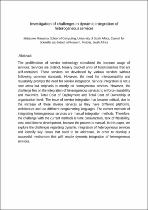JavaScript is disabled for your browser. Some features of this site may not work without it.
- ResearchSpace
- →
- Research Publications/Outputs
- →
- Conference Publications
- →
- View Item
| dc.contributor.author |
Makamba, M

|
|
| dc.date.accessioned | 2017-01-16T09:36:49Z | |
| dc.date.available | 2017-01-16T09:36:49Z | |
| dc.date.issued | 2016-03 | |
| dc.identifier.citation | Makamba, M. 2016. Investigation of challenges in dynamic integration of heterogeneous services. International MultiConference of Engineers and Computer Scientists (IMECS 2016), 16-18 March 2016, Hong Kong. | en_US |
| dc.identifier.uri | http://www.iaeng.org/IMECS2016/doc/titles_D_N.html | |
| dc.identifier.uri | http://hdl.handle.net/10204/8900 | |
| dc.description | International MultiConference of Engineers and Computer Scientists (IMECS 2016), 16-18 March 2016, Hong Kong.Due to copyright restrictions, the attached PDF file only contains the abstract of the full text item. For access to the full text item, please consult the publisher's website. | en_US |
| dc.description.abstract | The proliferation of service technology stimulated the increase usage of services. Services are distinct, loosely coupled units of functionalities that are self-contained. These services are developed by various vendors without following common standards. However, the need for interoperability and reusability prompts the need for service integration. Service integration is not a new arena but emphasis is mostly on homogeneous services. However, the challenge lies on the integration of heterogeneous services to enforce reusability and maximize Total Cost of Deployment and Total Cost of Ownership at organization level. The issue of service integration has become critical, due to the increase of these diverse services as they have different platforms, architecture and use different programming languages. The current methods of integrating heterogeneous services are manual integration methods. Therefore, the challenge with the current methods is time consumption, lack of flexibility, cost, total time to development, because the process is manual. In this paper, we explore the challenges regarding dynamic integration of heterogeneous services and identify key issues that need to be addressed, in order to develop a successful mechanism that will enable dynamic integration of heterogeneous services. | en_US |
| dc.language.iso | en | en_US |
| dc.relation.ispartofseries | Workflow;17609 | |
| dc.subject | Integration | en_US |
| dc.subject | Heterogeneous services | en_US |
| dc.subject | Dynamic integration | en_US |
| dc.subject | Dynamic services | en_US |
| dc.title | Investigation of challenges in dynamic integration of heterogeneous services | en_US |
| dc.type | Conference Presentation | en_US |
| dc.identifier.apacitation | Makamba, M. (2016). Investigation of challenges in dynamic integration of heterogeneous services. http://hdl.handle.net/10204/8900 | en_ZA |
| dc.identifier.chicagocitation | Makamba, M. "Investigation of challenges in dynamic integration of heterogeneous services." (2016): http://hdl.handle.net/10204/8900 | en_ZA |
| dc.identifier.vancouvercitation | Makamba M, Investigation of challenges in dynamic integration of heterogeneous services; 2016. http://hdl.handle.net/10204/8900 . | en_ZA |
| dc.identifier.ris | TY - Conference Presentation AU - Makamba, M AB - The proliferation of service technology stimulated the increase usage of services. Services are distinct, loosely coupled units of functionalities that are self-contained. These services are developed by various vendors without following common standards. However, the need for interoperability and reusability prompts the need for service integration. Service integration is not a new arena but emphasis is mostly on homogeneous services. However, the challenge lies on the integration of heterogeneous services to enforce reusability and maximize Total Cost of Deployment and Total Cost of Ownership at organization level. The issue of service integration has become critical, due to the increase of these diverse services as they have different platforms, architecture and use different programming languages. The current methods of integrating heterogeneous services are manual integration methods. Therefore, the challenge with the current methods is time consumption, lack of flexibility, cost, total time to development, because the process is manual. In this paper, we explore the challenges regarding dynamic integration of heterogeneous services and identify key issues that need to be addressed, in order to develop a successful mechanism that will enable dynamic integration of heterogeneous services. DA - 2016-03 DB - ResearchSpace DP - CSIR KW - Integration KW - Heterogeneous services KW - Dynamic integration KW - Dynamic services LK - https://researchspace.csir.co.za PY - 2016 T1 - Investigation of challenges in dynamic integration of heterogeneous services TI - Investigation of challenges in dynamic integration of heterogeneous services UR - http://hdl.handle.net/10204/8900 ER - | en_ZA |






